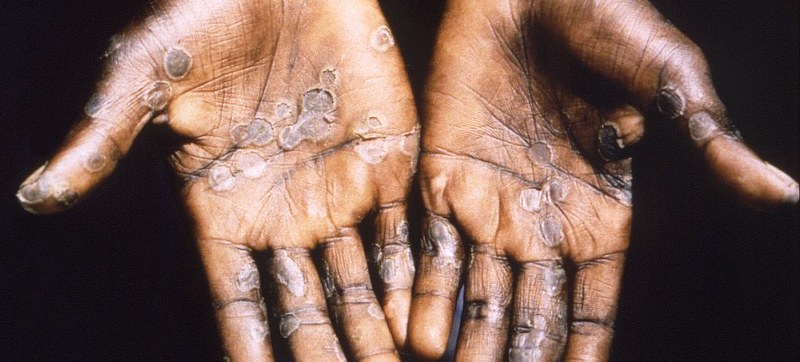 Mpox
Mpox
India detects first suspected mpox case
A young male, who recently travelled from a country currently experiencing Mpox (monkeypox) transmission, has been identified as a suspect case of Mpox, India's Ministry of Health and Family Welfare said on Sunday.
"The patient has been isolated in a designated hospital and is currently stable," the Ministry said in a statement.
The Ministry said samples from the patient are being tested to confirm the presence of Mpox.
"The case is being managed in line with established protocols, and contact tracing is ongoing to identify potential sources and assess the impact within the country," read the statement.
The Ministry further said the development of this case is consistent with the earlier risk assessment conducted by the NCDC and there is no cause of any undue concern.
"The country is fully prepared to deal with such isolated travel related case and has robust measures in place to manage and mitigate any potential risk," the statement said.
What is mpox?
Formerly known as monkeypox, the viral disease can spread between people, mainly through close contact, and occasionally from the environment to people via objects and surfaces that have been touched by a person with mpox.
Originating in the Democratic Republic of the Congo in 1970, mpox was neglected there, according to WHO.
“It is time to act decisively to prevent history from repeating itself,” said Dimie Ogoina, who chairs the International Health Regulations’ Emergency Committee, which advises WHO on such matters.
Endemic in central and West Africa, the infectious disease later caused a global outbreak in 2022, leading to a WHO public health emergency in July as it became a multi-country outbreak.
Following a series of consultations with global experts, WHO has begun using a new preferred term “mpox” as a synonym for monkeypox.
What are the symptoms?
Common symptoms of mpox include a rash lasting for two to four weeks, which may be started with or followed by fever, headache, muscle aches, back pain, low energy and swollen lymph nodes.
The rash looks like blisters and can affect the face, palms of the hands, soles of the feet, groin, genital and/or anal regions, mouth, throat or the eyes. The number of sores can range from one to several thousand.
People with mpox are considered infectious at least until all their blisters have crusted over, the scabs have fallen off and a new layer of skin has formed underneath, and all lesions on the eyes and in the body have healed. Typically this takes two to four weeks. Reports show that people can be re-infected after they’ve had mpox.
People with severe mpox may require hospitalisation, supportive care and antiviral medicines to reduce the severity of lesions and shorten time to recovery.
How does mpox spread?
Human to human: Touching, sex and talking or breathing close to someone with mpox can generate infectious respiratory particles, but more research is needed on how the virus spreads during outbreaks in different settings and conditions, says WHO.
What scientists do know is that it is also possible for the virus to persist for some time on clothing, bedding, towels, objects, electronics and surfaces that have been touched by a person with mpox. Someone else who is in contact with these items may become infected without first washing their hands before touching their eyes, nose and mouth.
The virus can also spread during pregnancy to the fetus, during or after birth through skin-to-skin contact, or from a parent with mpox to an infant or child during close contact.
Although getting mpox from someone who is asymptomatic has been reported, there is still limited information on whether the virus can be transmitted from someone with the virus before they get symptoms or after their lesions have healed.
Humans to animals: Since many species of animals are known to be susceptible to the virus, there is the potential for spillback of the virus from humans to animals in different settings.
People who have confirmed or suspected mpox should avoid close physical contact with animals, including such pets as cats, dogs, hamsters and gerbils, as well as livestock and wildlife.
Animals to humans: Someone who comes into physical contact with an animal which carries the virus, such as some species of monkey - or a terrestrial rodent like a tree squirrel - may also develop mpox. Such exposure can occur through bites or scratches, or during activities such as hunting, skinning, trapping or preparing a meal. The virus can also be caught through eating contaminated meat which is not cooked thoroughly.
Can it be fatal?
Yes, for a small minority. Between 0.1 per cent and 10 per cent of people who have become infected with mpox, have died.
It is important to note that death rates in different settings may differ due to several factors, such as access to health care and underlying immunosuppression, including because of undiagnosed HIV or advanced HIV, according to the UN health agency.
In most cases, the symptoms of mpox go away on their own within a few weeks with supportive care, such as medication for pain or fever, but, in some people, the illness can be severe or lead to complications and eventual death.
Newborn babies, children, people who are pregnant and people with underlying immune deficiencies - such as from advanced HIV - may be at higher risk of more serious mpox disease and death.
Support Our Journalism
We cannot do without you.. your contribution supports unbiased journalism
IBNS is not driven by any ism- not wokeism, not racism, not skewed secularism, not hyper right-wing or left liberal ideals, nor by any hardline religious beliefs or hyper nationalism. We want to serve you good old objective news, as they are. We do not judge or preach. We let people decide for themselves. We only try to present factual and well-sourced news.







